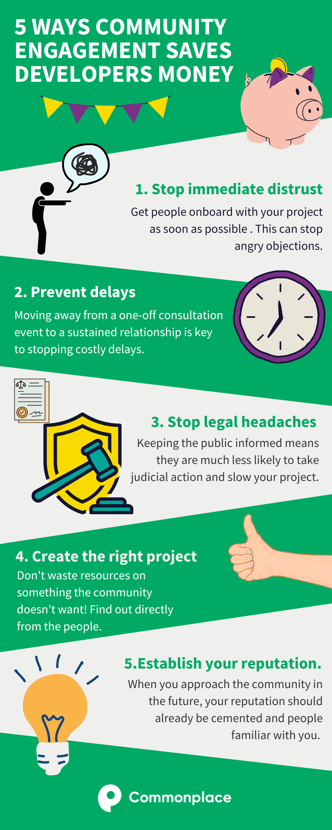5 ways community engagement saves developers money

By Charlotte Cooper | 15/02/23 16:43
4 min read
Don’t let your next development become a nightmare! If you’re a developer about to embark on a new project, you’re not going to want to miss this. Read on to see why a thoroughly planned community engagement strategy is crucial for saving you a lot of time and money.
Community engagement has multiple benefits for developers, but it can be hard to put pounds and pence against them. That’s why we’re here- to break down the return on investment (ROI) and show you where money is saved with a thorough engagement strategy.
In this blog, we’ll cover the most expensive bugbears for developers and how to address and mitigate them:
- Locals suspicious and untrusting of your project
- Long delays
- Court action
- Investing money in something people don’t want or need
- Immediate objections to future developments
Learn how to save money on your next project with a FREE 15 minute chat. Our engagement experts are waiting for you!
1. Stop immediate distrust
We’ll start with where most of the costs we’ve listed come from: major distrust from the community.
When you consult, people often feel like you’ve already made the decision and you’re not actually interested in their thoughts.
If you brush over community engagement, you’re already putting yourself at a disadvantage. Most locals will be unaware and feel you’re forcing a project they don’t want or need into their local area. They are much more likely to say “not in my backyard,” and raise objections from the beginning to the end of your project, causing you multiple issues down the line. When you start engagement early, you’re having a much more friendly conversation where the community can feel like equals, rather than just an exercise to be ticked off. Yes, money is scarce at the inception of a project and before planning permission unlocks more capital - but allocating enough to engagement early on pays dividends.
2. Stop delays in their tracks
We believe that delays are not an inevitable, unavoidable expense. That may be true of the weather; can be true of skill shortages - but need not be true of community objections. Introducing plans earlier help.
At Commonplace, we don’t just want the community to tell you what they want, but for project-partners to provide full loopback communication to the community so that there is a continuous dialogue about placemaking. Moving away from a one-off consultation event to a sustained relationship is key to fundamentally building trust between communities and those delivering change. As a developer, you may not have thought that you had signed up to handle emotional reactions - but you will elicit them. When communities have all the facts about the development and see their voices being listened to around these plans, delays caused by ill-informed objections can be greatly reduced.
3. Prevent legal headaches
Public inquiries, courts and Judicial Reviews are things that every developer wants to avoid and not just because of the costs involved, but the hit your company and your reputation will take while you sort it out. While we’re sure you’ve completed every legal necessity for your project, that doesn’t mean that delays caused by court action aren’t a possibility.
If the community has issues with aspects of your project and finds no easy or clear way to raise these issues with you (or they feel their complaints are brushed aside or ignored) then they may resort to confronting you through legal channels.. This could grind progress to a halt while you sort it out, costing you time and money. Seeking to recover this cost through intensifying your development is tempting, but can lead to further escalation.
This ties into our previous point about creating a trusted community dialogue. Issues can be brought to you directly and in return you can show people directly how you’ll be addressing them. We’ve seen that if people are more informed and seen to be consulted as equal stakeholders in a project, then things go much more smoothly. This applies to the local community and also to local councillors. You might not carry all the public with you, but genuine engagement makes it easier to make the case for your project in the formal planning process - it will be seen to reflect outcomes of local discussion and compromise.
4. Invest your money in projects people need
It should be obvious that when the public is engaged and have more positive feelings around a development then they will generate more economic resiliency by being much more interested in the final outcome.
As developers, one of the biggest risks you run is putting precious time, effort and money into a project that the community doesn’t want. How do you know what locals will definitely use? Ask them!
There may be existing data on housing needs, but that will not overcome resistance on it’s own. You need insight into what the locals feel they, as current residents, need now. Communities are made up of people, not statistics - people with cultural differences and multiple relationships to the local area. These are the things you also need to consider and that your previous data may not have factored in.
This is where you need to plan your engagement carefully. Different strategies will resonate better with different people, so researching how people get their news and raise their local concerns is vital to reaching as many demographics as you can. Consider who will be able to leave a comment on an engagement website and who may prefer to speak to you in person. Are there other languages to consider as well? What about other accessibility needs?
Not sure where to start?
Download our free helpful engagement guide
5. Ensure a smoother process for future projects
Having a well-rounded engagement strategy doesn’t just make things easier (and more cost-effective) for this project, but for your future projects in the area too! When you approach the community in the future, your reputation should already be cemented and people familiar with you and what they do. Plus you can show people the impact they had in your last project, encouraging and even increasing engagement in this one!
We could go on for days about the benefits of proper community engagement for developments, but we know you’ve got other places to be!
So let’s sum up how you’ll save money:

Learn how to save money on your next project with a FREE 15 minute chat. Our engagement experts are waiting for you!
.png)
